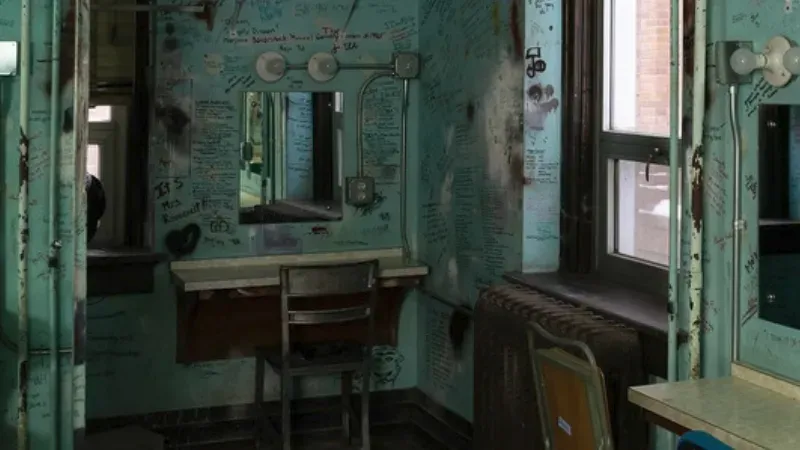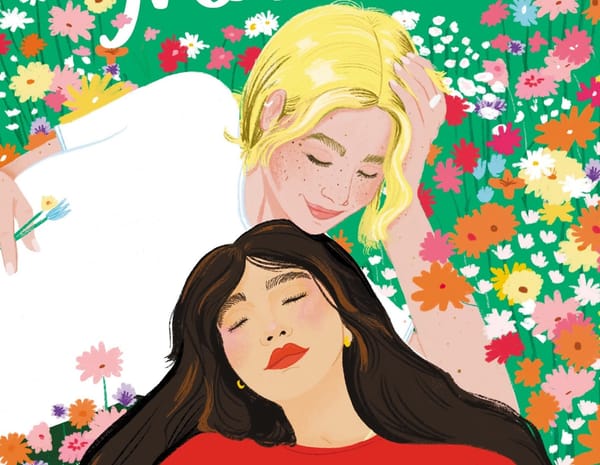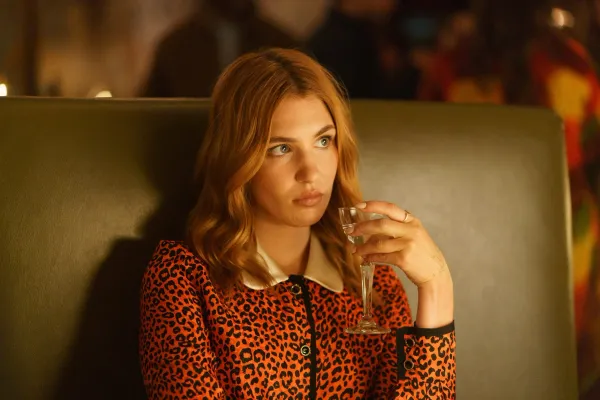The ghost
What happened when I went to college just because I had to

Every college theater department has a theater ghost, and South Dakota State University's was no different.
Our ghost was named George, and he haunted Doner Auditorium, the lonely old mainstage theater where we put on most of our shows. (Before you ask, it's pronounced like the word "donor.") Built in 1912 and originally intended as a space where all students could gather at once, Doner was a quirky place, with terrible sightlines and a number of audience seats behind poles. The only way to load in scenery was to lift it up over an outdoor fire escape, then squeeze it in through some double doors. Doner was never meant to be a theater, not really. But we all learned to mold ourselves to its shape.
Go just far enough off stage right at Doner, and you would come to a rickety old staircase. Climb that up to a balcony, and you would find two small rooms, each stocked with props and costumes and other items one might need to put on a show. George was said to haunt this prop room in particular. He had died there. Of what, nobody knew.
The only evidence for George was a saying in an old yearbook from the 1920s, thanking a member of the theatre department at that time for "giving us George." I heard about this from my friend Deb, who hosted the most amazing house parties and who always seemed like she was poking at my edges to figure out what mold was holding my shape. Deb was the main propagator of George mythos while I was in college, and she offered up the yearbook story with a flourish late one night after most party attendees had gone home to sleep.
George sightings were few and far between, but everybody who spent any significant amount of time in the program would have something weird happen to them. One late summer night, two of my friends saw a chair start to spin all on its own. Lighting techs working late at night would report strange banging and other noises. And one of the professors said she had actually met George but would not tell the tale. It had scared her speechless.
All of these stories were told with a wink. If you poked at them hard enough, you'd find either hyperbole or a natural explanation. But Doner was a windy, wheezy old space, and it needed to be haunted. Had we not had to invent George in order to haunt the space, he would have existed.
One summer night, working the light booth for You're a Good Man, Charlie Brown, I could feel something building in the air behind me. It felt chilly and sinuous, and part of me knew it was the building's air conditioning, but I didn't want to turn around and look. Someone was behind me. So long as I didn't look, they weren't. Once I did, they would be there. My parents were in the audience that night. I didn't dare embarrass myself by screaming.
Deb was also working backstage, and we kept each other company on coms. "Deb," I said, "I feel something up here. The air got really chilly all of a sudden."
"Yeah," she whispered, "that's how you know he's watching. He'll go away eventually."
In 2018, South Dakota State University finally finished construction on an 850-seat theatre in which State University Theatre and its summer cousin Prairie Repertory Theatre could stage their shows. As a consequence, Doner Auditorium ceased to be used as a theater.
After the theatre department had left Doner, a team of photographers went about painstakingly making a digital record of a physical record all us theatre kids had left behind. In the makeup rooms backstage — just one floor below the props room George was said to haunt in particular — we would sign our names and write a list of the roles we had played beneath them. Photographers took pictures of these signatures, then uploaded those pictures to the internet. You, too, can experience the backstage area of Doner Auditorium with a few mouse clicks, should you so desire.

When one of my best college friends posted a link to these photos on Facebook, I couldn't help myself. I went to see if I had signed my name on the wall in a place where one of the photographers had managed to take a picture of it. I looked through photo after photo after photo, in all of the spots where I might have signed my name, and I didn't see it, and I didn't see it, and I didn't see it, and then I did. My old name.
I had dubbed myself [Dead Name] "America's Sweetheart" VanDerWerff, which was the sort of thing I did back then, a tap-dancing performance of myself so furious that I left myself no room to exist as anything other than a role others had thrust upon me. I'm not going to link you to the photo with my name in it, but I'm sure you can find it if you wish.
The list of roles is not sizable. Somewhere in my sophomore year, everybody (myself included) realized I was pretty good at directing, so they started shunting me toward that task. I was in a few shows, and I was pretty good in some of them. I even won an award (for playing the racist juror in 12 Angry Jurors). But try as I might, I could never become as good of an actor as I wanted to be. Something about me always felt stilted and off, in a way even my professors couldn't quite explain.
But at the end of another long summer theatre party, my friend DJ diagnosed the problem with an accuracy even I didn't quite understand. We were sitting outside, watching the sun come up, when he looked at me and said, "You're one of the smartest people I know, but your brain has no idea what to do with your body."
My first year at South Dakota State, I was anxious for any reason not to go home, and I had received a scholarship from the theatre department. The scholarship came courtesy of one of the professors, who had seen me in a few of my high school plays and liked what I was trying to do. She was also dating a distant relation. South Dakota was like that.
As part of my scholarship, I was required to audition for every show and to put in 20 hours of behind the scenes work for every show. And so I slowly but surely started to make friends in the department.
SDSU theatre was a haven for queer kids, though I don't think any of us would have described ourselves that way back then. Of course there were rumors that many of us were gay, some of which turned out to be true. And I certainly loved that within the theatre department, I found a space where I could just be, absent of expectations. My parents desperately wanted me to be a musician; I desperately wanted to be a writer. The theatre department was somehow neither and both at the same time.
But what most appealed to me about theatre was that I could just show up, pretty much any time of day, and find somebody working on something. I was bad at most of it, and I don't know how much I helped anybody, say, set up a lighting plan or patch up a costume. But on weekends when I was intent on not going home, there would be someone in the scene shop, painting a flat or constructing something. I could show up and use it as a plausible excuse to stay for the weekend.
And even in the middle of the night, you could show up in Doner, and someone would surely be there, usually one of the lighting guys. If you could get into the building, they'd take whatever help they could get. And then, maybe, you'd both hear a door slam shut somewhere in the auditorium and know that even had either of you been there alone, you wouldn't really be alone. There was always someone watching. He would go away eventually.
I had not wanted to go to SDSU. I tried mightily not to go. Both of my parents had gone there, and my mother's father had gone there, and...
It was the biggest school in the state, but it was a small school all the same. Under 10,000 students attended while I was there, and even in 2020, the number was just barely north of 11,000. I wanted to get lost, and that was going to be very difficult at SDSU, which might be why I landed in the theatre program. It was pretty off the radar of the things that had been expected of me. Some part of me liked that.
But SDSU was never my plan. My dream was to go to UCLA, to study film and television writing. I had wanted to move to Los Angeles for as long as I had been alive, and I had wanted to be a TV writer for most of my adolescence, and here was a way to do both at once. I got into UCLA. But, I was told by my parents that even though we could afford it (especially with a scholarship), I wasn't going to UCLA.
The reasoning they gave was, more or less, that leaving the town of 750 people I grew up in and going to Los Angeles immediately would have eaten me alive. It was an explanation that mostly made sense to me, and I didn't question it, because I wasn't in the habit of questioning the molds that held my shape. Another friend and I briefly made plans to go to the University of Minnesota together, before those imploded spectacularly.
Even when I found myself limited to schools I could drive to in an afternoon, I tried my damnedest not to go to SDSU, briefly making noise about going to the University of South Dakota, SDSU's most hated rival. But eventually, I did the thing I was always going to do. I was being molded into an SDSU student, and so I would be an SDSU student.
I feel bitter, often, about my college experience. It's not something I remember, not really, except in starburst moments of memory that feel almost unreal to me. That time was the furthest I ever was from the person I needed to be, because I could sense this other life I should have led but was not. I met my wife at SDSU, and Tracey Sayed, who is one of the leads in Arden, was also in SDSU theatre productions. So I don't regret my college years, not exactly.
But every few weeks, I stop to eat lunch at a spot near the UCLA campus. As students wander in and out, ordering their lunch or showing up for a shift, I look at them and wonder if I really would have been eaten alive or if I would have figured out how to survive more quickly than even I would have expected. I wish I had seen how much stronger I was than they ever allowed me to think I was.
On Halloween night 2001, a few friends got drunk and decided to try summoning George with a Ouija board. I was very into the idea of electronic voice phenomena at the time, so one of my friends brought her recorder and set it on the floor to record the whole interaction. They crowded around the board in the props room and tried to summon the dead.
I didn't join them. I was too scared of seeing a ghost, though much less than I was of not seeing a ghost. I stayed on the main stage with a friend. The most recent show we had put on was Sweeney Todd, and it was eerie to be there, in Doner, on Halloween, in the dark, surrounded by elements of that show.
Then we heard a door open somewhere in the auditorium. Upstairs in the balcony, a man descended the stairs slowly, stopping at the front to look down at the two of us on the stage. He was in a janitor's uniform, but we mostly knew the janitors who worked in the building that late, and he didn't look familiar. But we were also looking at him from a distance, in a shadowy space. Surely, up close, we would have known him.
"Should you be here?" he asked.
"We're working on a show," my friend said, because he lied easily.
"I thought the show was over," the janitor said. "It was last week."
"There's always a show," my friend said with a smile.
The janitor finally nodded and turned, climbing the stairs back up to the exit at the top of the balcony.

Later, the group of us that had gone to Doner on our ill-advised ghost-hunting trip congregated at my apartment to play the recording of the seance. Mostly, we heard the voices of our friends, and the handful of times we thought we heard something else turned out to just be one of them putting on a silly voice or something. (We were all, after all, theatre kids, and many of us were drunk.)
Well. Except for one.
At one point, you can hear the woman leading the seance ask George if he has anything he would like to tell them. And then, maybe a whisper, maybe an echo, maybe a distortion, maybe a voice, maybe the wind, says, "Tell me what?"
I was telling a friend a few weeks ago about how I ended up in Los Angeles anyway, even after everything in my life tried to keep me from getting here. My brain had no idea what to do with my body, but it could trick it into falling in the right direction.
The metaphor I used was this: I only went skiing a couple of times, because my body and brain were so disconnected that I simply could not figure out how to stop. So every time I had to stop, I would just hurl myself at the ground, because that was easier than convincing my body it knew how to make the skis move in just the right way to navigate. But I did manage to make it down the hill that way. I could start and stop, in my own fashion.
That was how it went in my life, too. When I saw the thing I needed, I would keep it in my peripheral vision, so even I wouldn't know what I was aiming for, and then at the last possible moment, I would lunge toward it, toppling over in the process. But I would get there in the end. And so I ended up in Los Angeles, and so I ended up transitioning, and so I ended up a writer.

Joining a college theatre department because it would buy me just enough space to start to become myself wasn't my ultimate goal — I got a little sick of it eventually and joined the college newspaper instead — but it was a lunge toward something I wanted for myself, not because I had been told to want it. I didn't understand what I was doing at the time, and I couldn't have told myself why it was happening, but it ended up being part of the plan anyway.
I imagine myself at that time rattling around in a lonely old body, reaching out every so often to knock something off of a shelf or slam a door somewhere. I had to learn how to have a body. The dead always do.
"That's how you know he's watching," Deb said. "He'll go away eventually."
It took a few minutes, but the feeling dissipated. The prickling at the back of my neck gave way to the normal, sticky, too-warm feeling of the lighting booth on an August night. If George had been there, he had gone back to wherever he came from. After the show, my parents told me how much they had liked it, and we all went out for a late dinner. I told myself I was happy.
I remember those years mostly as a series of moments illuminated ever so briefly by flashbulbs. I was so dissociated that people will tell me stories about who I was at that time, and I will nod and say I remember. But I only ever remember the edges of things more than the things themselves. I am not seeing whole moments. I am seeing the handful of seconds when I was there, inside my body, able to interact with the world, before I went away again.
There's almost no record of my time there. I made very little mark. You could forget my presence there if you really tried. I wrote my name on a wall, but it was the wrong one. It was the most important thing in the world to me, until it wasn't, and then it fell away from me quickly, like mist.
Nobody is putting on shows in Doner anymore, but I assume George is still there. I wonder if he only has little flashbulb memories of his existence, when he is dragged forth into our plane of reality for a few moments, then, bewildered, tries to make sense of what he's seeing before he's jerked away again. He makes a chair spin. He slams a door. He appears in the middle of the night to ask if there's a show going on.
Maybe he remembers a night in August, when he unexpectedly found himself staring at the back of a girl's head, hoping she would turn around and look at him, because if she just did, he had a secret to tell her, a secret she needed to hear.
Talk back to me: Tell me your favorite ghost stories. It's October. Let's GOOOOOOOOO.
What I've been up to: I had a great deal of suspicion about FX's Y: The Last Man, so I'm pleased that the show has mostly ended up being something I have enjoyed and even found thoughtful. I talked to showrunner Eliza Clark for this piece on how the series is grappling with our gender glitter bomb of a world. (It also contains the below transition, which might be my favorite I've ever written.)
I admire this line of thinking, and I like Y: The Last Man, and I think the show is making a sincere effort not to exclude trans people from its narrative. I’m going to keep watching, if only for the chemistry that has developed between Ashley Romans as the ultra-capable Agent 355 and Ben Schnetzer as Yorick (the last cis man of the title).
But.
What you missed if you're not a subscriber to Episodes: I'm taking the month off from recaps, thanks to my impending surgery (one week away as I write this!). But the freelance newsletters continue apace! This week, Teffer Adjemian made the case for Hello, Dolly!'s queer, leftist utopia.
Watching it in 2021, I was also struck by how distinctly, well, queer the whole thing is. Bright young men Barnaby and Cornelius burst out of their cellar-closet and their small town. Cornelius, at “twenty-eight and three-quarters,” has never touched a woman, let alone “kissed a girl.” Irene Molloy, strong, independent, and contentedly single, figures she might as well get married so she can stop “being suspected of being a wicked woman with nothing to show for it.” In The Matchmaker, the Thornton Wilder play on which Hello, Dolly! is based, Irene Molloy is a widow. Hello, Dolly! rewrites her as a spinster and dresses her in the boater and blouse a suffragette might wear. (The film gives Horace Vandergelder a similar treatment, changing him from a widower to a confirmed bachelor.) Yet, somehow, this world full of secluded queer characters finding ways to benefit from heteropatriarchal capitalism isn’t depressing. No, it’s full of revolutionary optimism. And that is the power of Dolly.
Read me: I really like this piece by Sophie Haigney on children's biographies of famous historical figures (especially famous historical women) and who, exactly, they're supposed to be for, even. Do kids enjoy these? Or are they just ways to prop up the brand of other famous people?
Harriet Tubman was born a slave, and her story could have ended there. Instead, she persisted, escaping from slavery and becoming the most famous ‘conductor’ on the Underground Railroad,” begins the first section of Chelsea Clinton’s baffling 2017 children’s book, She Persisted: 13 American Women Who Changed the World, illustrated by Alexandra Boiger. True to its subtitle, the book marches on through thirteen stories of women persisting. Helen Keller persisted, by learning to read and write. Nellie Bly, told by a male colleague that working women were a “monstrosity,” persisted to become a working woman anyway. Sally Ride persisted to overcome stereotypes about women in STEM to travel to space. Ruby Bridges persisted when she attended kindergarten despite threats on her life from segregationists. Oprah Winfrey persisted by rising from humble origins to media superstardom. In case you managed to miss the message, it appears in bold, colorful letters in every woman’s story: “She persisted.”
Watch me: I really, really dug this video on the history of "narrative choice" games and the sexism and racism too often bound up in them from the great channel No Pun Included. I also like that the context is all a wind-up to recommend a game the reviewers think gets narrative choice games right.
And another thing... I am powerless to resist videos of people going back to Broadway after 18 months away. I have watched every single one of them, and I will watch every single one more.
Opening credits sequence of the week: "This little truck goes everywhere in search of lovers, in search, really, of you and me. For each of us at some time have been involved with matters of the heart..."
What I had to look up: The entire history of Doner Auditorium, which turned out to be a pretty nifty thing! You can read more about it and about George right here.
This week's reading music: "Ride, Captain, Ride" by Blues Image
Episodes is published three times per week. Mondays feature my thoughts on assorted topics. Wednesdays offer pop culture thoughts from freelance writers. Fridays are TV recaps written by myself. The Wednesday and Friday editions are only available to subscribers. Suggest topics for future installments via email or on Twitter. Read more of my work at Vox.




